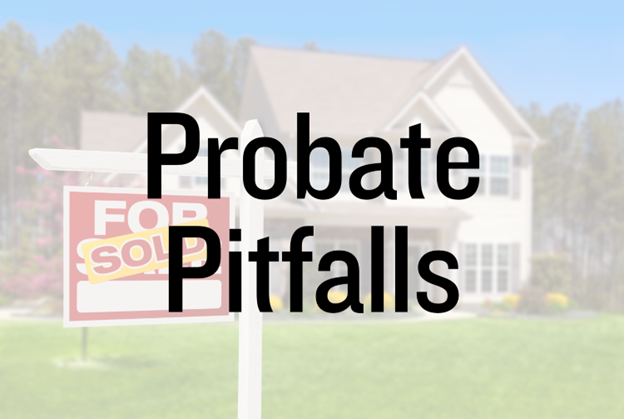
Probate properties present unique challenges and pitfalls that can easily catch sellers off guard if they are not properly prepared. While losing a loved one and being tasked with selling their property can be overwhelming at times, it’s an essential duty that should be carried out with care and consideration.
Let’s talk about probate and three common pitfalls that sellers fall into when selling a probate property. We’ll discuss the selling process from start to finish so you can get started on the right foot when selling your probate property this year.
What is Probate?
While probate often involves liquidating real estate assets, there are additional considerations to take into account during the process. Probate also requires the distribution of other assets that include financial investments, bank accounts, vehicles, and business ownership stakes.
The direction of the probate process significantly depends on whether or not the deceased person has a will. If they do, an executor (often a family member) is responsible for starting the probate process by filing the will with a probate court.
In cases where the deceased person doesn’t have a will, an administrator is appointed to manage the distribution of assets, just like an executor. Administrators often attempt to locate family members of the deceased, as most states require assets to be distributed among children and the surviving spouse.
The Selling Process
A real estate probate sale is often a long and drawn out process, but it can pay off in the end. Let’s discuss the process for selling a home during probate so you know what to expect and why you should sell your property to Capable Home Buyers this year.
Determining the Executor
The first step of the selling process during probate is for an executor or administrator to be appointed. This often occurs by the court naming a close relative or friend with the best interest of the deceased person in mind when distributing their assets. Alternatively, the deceased individual may name an executor in their will.
After the executor or administrator is appointed, they start by assessing the assets left behind by the deceased individual. In addition to real estate, the executor assesses other assets like cars, jewelry, and stock holdings to develop a plan to distribute these assets.
Receiving Court Approval
Although specific procedures may vary by state, the probate court typically decides whether the probate sale is formal or informal. A formal probate process involves the court approving all steps of the real estate transaction and is often much longer than an informal sale. For example, some formal real estate sales take six months or longer due to court intervention.
The probate court also has strict requirements for the home’s appraisal, as most states require the home to be sold for 90 percent or more of the appraised value. After the court hearing is over and the judge signs off on the sale, the property hits the market.
Considering Offers
Another court hearing is required after receiving one or more offers on the property. This court hearing is designed to give other buyers the opportunity to bid on the property. While the interested parties wait for the court hearing, the executor must advertise the property in a local newspaper with the sale price displayed.
On the day of the court hearing, additional buyers can also show up to bid on the property. After the bidding process, the winning bidder is confirmed by the court and the executor completes the sale. Keep in mind there are strict bidding rules and restrictions for probate homes, so be sure to understand the ins and outs before accepting any offers.
Navigating Closing
The closing process for probate homes is relatively straightforward and operates the same as a regular real estate sale. The buyer will need to be approved for a mortgage unless they are a professional home buyer purchasing the property in cash.
The home will need an inspection to check for any material defects or safety hazards that must be disclosed before selling. After this, a closing date is set and you’ll officially transfer the property to its new owner.
3 Pitfalls When Selling a Probate Property
Those new to the probate process may find it difficult to navigate without the right information at their disposal. Here are the most common pitfalls when selling a probate property for the first time.
#1 – Not Understanding the Probate Process
Probate is a complex proceeding with many moving parts. For most families, selling real estate assets is only one part of the process. There are often many other assets that must be distributed among family members.
Those that find themselves as the executor or administrator should do plenty of research on the probate process in their state or work with a qualified estate planning attorney to ensure a thorough understanding of the steps involved.
#2 – Managing Disputes
We’ve all seen movie scenes where siblings engage in intense fights over the assets of a deceased family member. For example, siblings often fight each other for real estate, vehicles, investments, and other assets left behind.
Unfortunately for many families, this movie scene often comes true. This is why the executor or administrator should understand how to manage disputes among family members, especially for deceased individuals without a will.
#3 – Property Maintenance and Presentation
During the probate process, you might be tempted to neglect the house and fall behind on standard maintenance tasks. Sometimes you may simply forget to pay the landscapers, or you may be busy with work and taking care of your children.
Whatever the case may be, it’s crucial to keep up-to-date with property maintenance on the probate property. Doing so will allow you to receive more money when selling your home and attract more buyers for when the house hits the market.
Final Thoughts
Selling a probate property is a stressful and time-consuming process. On top of recently losing a loved one, you’re tasked with sorting through their assets and distributing them among family members, which can be a depressing task.
Using the information discussed in the article, you’ll have a better understanding of the probate process and the common pitfalls when selling a property in probate this year.
